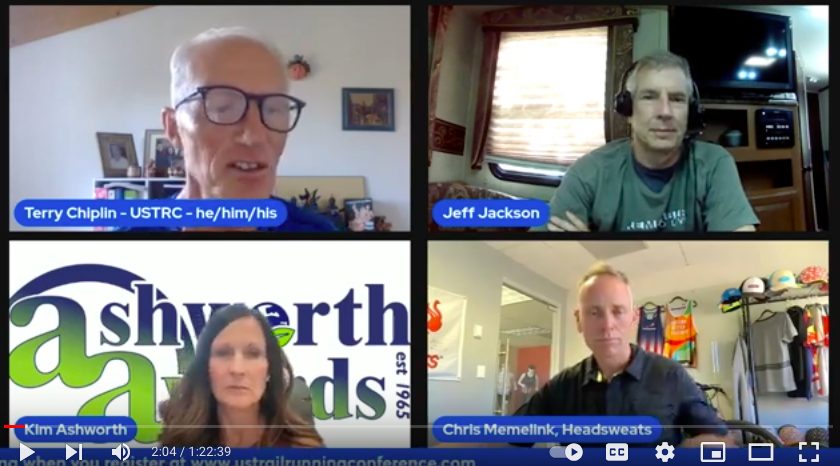US Trail Running Conference RD Master Class Webinar Highlights Sustainability Initiatives
September 25, 2024

Brand leaders and zero waste race consultant among the panelists
/ENDURANCE SPORTSWIRE/ – Mastering Sustainability, Innovations and Inspirations from Brands was the subject for the eighth webinar in the nine-webinar RD Master Class series produced by the US Trail Running Conference presented by Marathon Printing, and was live on Tuesday, August 27. The webinar series is free for all race directors and event organizers to access, and is held in partnership with the American Trail Running Association.
This webinar’s panelists featured four brands that are sustainability leaders in the sport, as well as a zero waste race consultant.. Anthony Foster, Director of Operations, Marathon Printing, Inc., and Presenting Sponsor for the Conference and the RD Master Class Webinar Series. Kim Ashworth, Vice President & CFO, Ashworth Awards, and an exhibitor at this year’s USTRC. Chris Memelink, senior sales manager, Headsweats, the Official Headwear Supplier for USTRC. Sam Burke, co-founder of Tarkine Running, an eco-friendly shoe manufacturer based in Western Australia. Jeff Jackson, Happy Planet Running, a zero waste athletic event service. Terry Chiplin, founder of the US Trail Running Conference, was the moderator for the session.
Anthony Foster shared ways to reduce waste for items that races use on a regular basis. “Our common race bib sizes are 7.5 by 6 inches and 7.5 by 7.5 inches. What most people don’t know is that the bibs don’t have to be those sizes. You can choose a 4 by 6 bib, which can decrease waste by 40%! It’s a great option, you can still have all your design, all the usage that’s applicable to a race bib, and just not use quite so much product.”
Foster added other innovative ideas on ways to reduce waste when thinking about race bibs, including having more than one race featured on a race bib for companies that organize several races each year, a more rigid re-usable race bib that could be used multiple times at different races, and a digital bib idea as a future development.
Kim Ashworth followed up with how sustainability is a key focus for Ashworth Awards. “Sustainability is something that is near and dear to our hearts here at Ashworth Awards for a significant number of years, and we incorporate it into everything that we do. With every opportunity we work to make sure that what we are producing is truly sustainable, right down to what we are producing to when we are sourcing raw materials. Also, after things are shipped, what do we do with our items?….We make our products from recycled materials, and then the products are also recyclable…..we source wood locally from a mature tree farm, so we are not deforesting an area. We also recycle our acrylics.”
Ashworth added, “We are committed to non-plastic packaging across the board, that’s something we have been doing for at least three years now, so we’re not using plastic bags unless the customer specifically requests that. We use paper packaging to protect all of our medals and awards…we use paper tape that can also be recycled.”
Next, Chris Memelink explained how Headsweats incorporates sustainability as a central tenet for their business. “For Headsweats, proximity is everything. We moved all our production from China to El Salvador. It is 1.5 days by boat from El Slavador to Miami, and that’s how we enter the US market. Our supply chain is within 10 miles of our factory, so we effectively reduce our footprint. We take old shirts and scraps from manufacturing and put all this into making new yarn and new materials, fabrics, hats and shirts. Energy wise 79% of our factory’s energy comes from renewable resources. We are focused on keeping pollutants out of our rivers, lakes, and oceans. Our supply chain is completely vertical, so we manage everything from the fiber to the finished garment. We are also very proud that we are a part of the Higg Index, where you measure all parts of your supply chain and manufacturing processes.”
He added, “Sustainability is a mindset, how can we look at the total process for creating a garment, from the fiber, to the product, to the shipping, how can we conserve water and fossil fuels. We have partnered with Repreve to take water bottles out of landfills…and use the fabric to create headwear and apparel. We have been counting how many water bottles we have diverted out of landfills, and we are up to 231 million water bottles that we have pulled out of landfills, and put into headwear and apparel that we have returned to our customers.”
Jeff Jackson said, “Everyone has heard of the three Rs, reduce, reuse, and recycle. There are two additional Rs ahead of that when I am asked to do zero waste. The first one there is to Rethink – the best way for an event to be zero waste, is to not generate any waste … .The pandemic awakened race companies to rethink some of their fundamental assumptions, like does everyone have to have a t-shirt. So for many races now, the T-shirt is optional”
“I also love Anthony’s idea of a digital bib … .many trail races are now requiring runners to have a mobile phone and download a course map to the phone. Why not also have your race bib on your phone as well. When you show up, they scan it, and they say congratulations, you’re registered!”
“Another company at the end of their year held a left overs run. The fees were collected as donations for a charity, and when you showed up, you got a T-shirt from a random event, when you finished you got a random finisher medal, you got a random race bib. I declined the T-shirt, and wound up with a pink race bib for a Goddess race.”
Jackson went on to share details of his waste stream process at races, where he has been able to achieve high rates of waste diversion at races.
The final presenter was Sam Burke from Tarkine Running in Australia. “We are a grassroots, hard core running company. It’s more a social enterprise too, in that we work very closely with environmental organizations. Our goal is to be the most eco-friendly running shoe brand in the World …now we have an emphasis on using as much recycled products as possible, and an emphasis on quality products and products that last a long time. We are also putting as much energy as possible into recycling these shoes post use. When industry insiders talk about the costs of recycling sending shoe companies broke, I can tell you that is bullshit. We can afford to recycle these shoes post use, most companies just don’t wish to do it. If you see the earnings reports from major companies, they can afford to do it. We pay a cost per kilo to recycle these shoes. The technology is there, it’s not an Australian technology, there is the technology around the entire World to recycle shoes.”
Burke continued, “With our recycling company here we can turn the midsole and outsole into mats, like plastic mats, yoga mats, hospital grade mats…any of the parts of the upper that aren’t too damaged, you can reuse them, make materials, make wallets, all sorts of garments, tougher fabric, bags, all sorts of stuff. But it costs money. A, customers hopefully will pay for the shipping back to you, and then you need to pay for the costs from the storage facility to the recycle center. Then you need to pay the recycling center on a per kilo basis. Humans and machines are then cutting these products up, sorting them and recycling them. It’s a pretty lame excuse to say they can’t afford it….they can easily afford $3 or $4 per shoe to spend on recycling. They are not taking responsibility for the life cycle of their products.in this day and age you should be taking responsibility for the products that you are putting into the World.”
A recording of this webinar is available on the US Trail Running Conference YouTube channel at
https://youtu.be/LvJqt-kg8rA?si=HiiC3Dhv_DwKVxVp
Active at Altitude, organizers of the US Trail Running Conference and the webinar series, reported 205 participants registered for the session, representing 40 states, as well as Bolivia, Canada, Great Britain, Iceland, Macedonia, Russia and Saudi Arabia.
The next webinar in the RD Master Class series presented by Marathon Printing is titled: Mastering Using Photography to Supercharge Your Event, and takes place on Tuesday, September 17, 2024, from 10.00 a.m. to 11.00 a.m. MST. Panelists for this session are Kevin Youngblood, KEVLV Photography, Emily Cameron, Cameroncreativeco.com and Anastasia Wilde, Anastasiawilde.com.
Who is this for? Race directors and event organizers who are interested in using the creative power of photography to respectfully grow and promote their race or races.
Registration is free – see https://ustrailrunningconference.com/webinar-series/ for more details.
More info:
For details on the US Trail Running Conference and the webinar series, go to https://ustrailrunningconference.com/webinar-series/
Contact Event Director, Terry Chiplin for further information, terry@ustrailrunningconference.com, or + 33 06 79 76 31 53
#TrailConference #trailrunning #visitknoxsports #knoxville #marathonprinting #activeataltitude #atra #TrailConference2024




